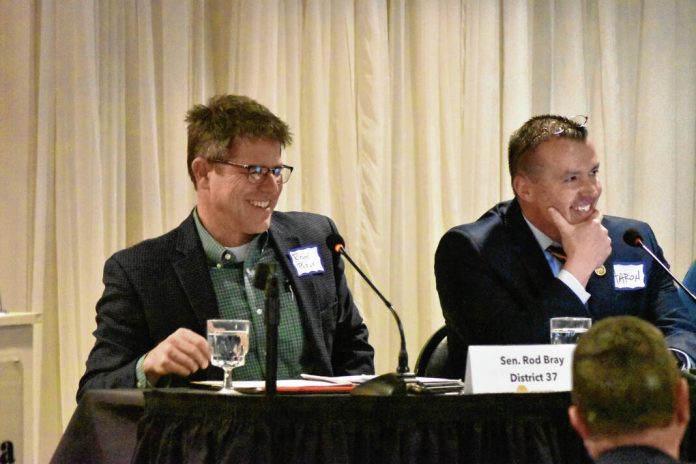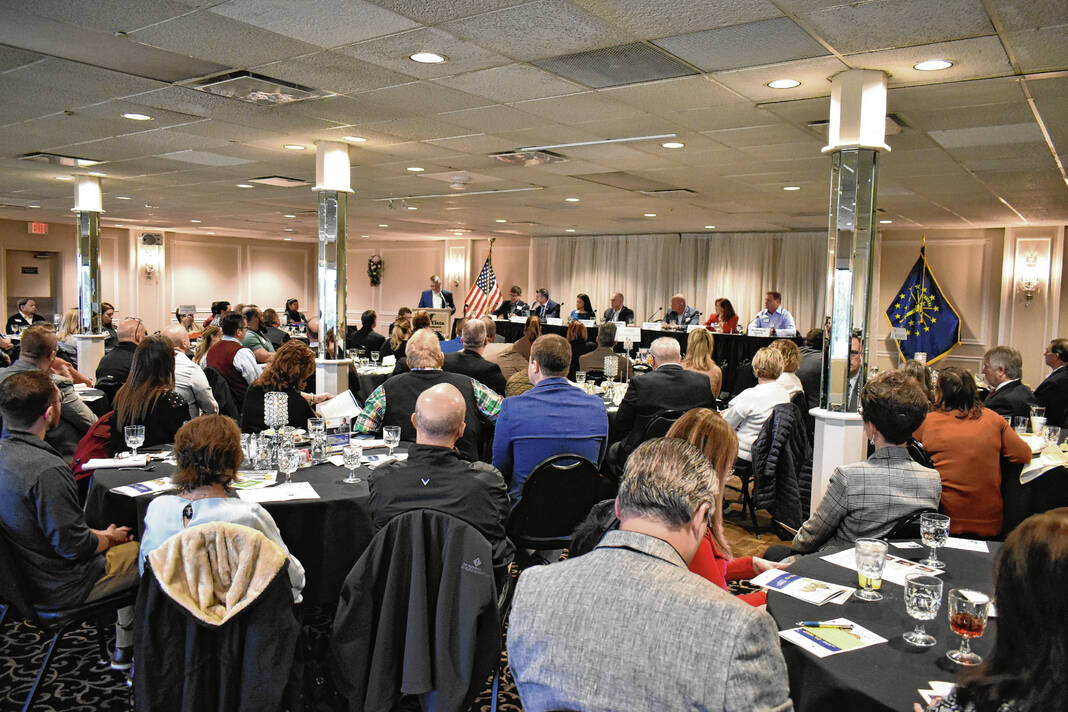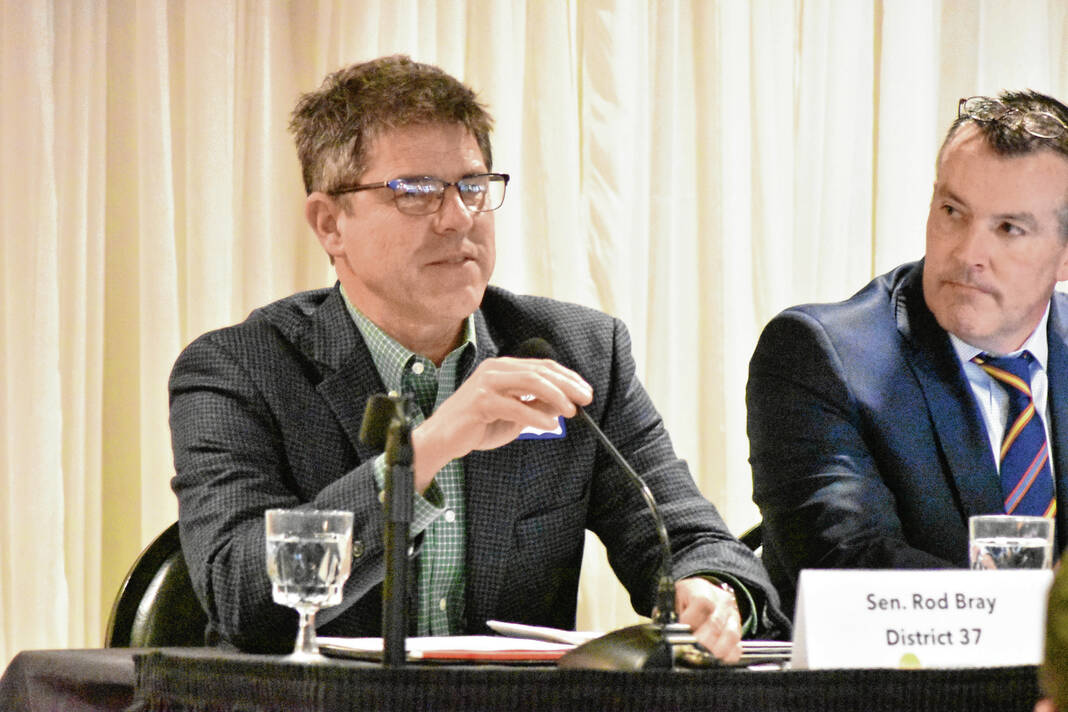The first week of the 2024 session of the Indiana General Assembly is done, but local lawmakers still have a lot of work ahead of them.
State lawmakers representing Johnson County and the southside of Indianapolis gathered at Valle Vista Golf Club in Greenwood on Friday for a Legislation Matters event hosted by Aspire Johnson County. Eight legislators discussed what they were working on, what the priorities are and issues important to Aspire and its members.
This year’s session is a short one, and lawmakers have about three months to get all of their business done before a March 14 statutory deadline to adjourn for the year.
Session priorities
Senate President Pro Tem Rod Bray, R-Martinsville, highlighted the Senate’s priorities this session. Among them are reading proficiency for third graders, child care and prior insurance authorization, he said.
Other priorities are clearing out dormant government accounts and flowing the funds into either Medicaid or the state’s general fund. They are also looking at creating a program to get rid of lead water lines in homes and multi-family apartments, Bray said.
Sen. Aaron Freeman, R-Indianapolis, has introduced Senate Bill 52, which would prohibit a public transportation project, like Indianapolis’ planned Blue Line, from including one or more dedicated lanes for the exclusive use of public transportation vehicles. This is his third year of introducing the bill, he said.
Freshman Sen. Cyndi Carrasco, R-Indianapolis, highlighted SB 190, which would improve the accessibility of the state’s Disaster Relief Fund, while also upping the maximum amount of individual aid. Sen. Greg Walker, R-Columbus, has been working mostly on changes within the Department of Child Services, which oversees child safety, he said.
House Bill 1177, which would outlaw certain nations that are “bad actors” from owning real property within Indiana, is a bill State Rep. Craig Haggard, R-Mooresville, is focusing on. Another bill he highlighted would address human trafficking, he said.
State Rep. Julie McGuire, R-Indianapolis, talked about House Bill 1001, which would improve provisions implemented last year in House Enrolled Act 1001. The bill addresses workforce development in high school and opens up scholarship opportunities for students, she said.
State Rep. Mike Speedy, R-Indianapolis, highlighted HB 1084, which would prohibit the government and private entities from keeping a list of or record of gun purchases to create a registry that could be used to “discriminate or otherwise marginalize” people exercising their right to own firearms, he said.
One of the main bills for State Rep. Michelle Davis, R-Whiteland, is a school safety bill that she has been working on with school police departments, including Center Grove and Clark-Pleasant. Currently, when a municipal police officer is hired by a school corporation, they lose the option to be on a 1977 pension plan, which gives death and disability benefits. HB 1104 would change that, she said.
Aspire’s priorities
One of the first questions posed to lawmakers by moderator Eric Prime was about child care, a legislative priority for Aspire, and what to expect this year.
Over the last few years, lawmakers have worked to add quality and safety to day care and child care, but as a result, have also added more regulation. This has caused them to become more scarce and expensive, Bray said.
“There’s just a balance there because high quality and safety are super important, but you can’t continue to work in that space just on those, and then all of a sudden you’ve choked off supplies,” he said.
With SB 2, legislators are trying to find ways to add providers while also decreasing regulation. For example, they hope to ease some of the restrictions so people who are under 21 could work at a facility, Bray said.
“There is some oversight and some ratios that they can’t watch because they’re super, super young, unless you have the real supervision or immediate supervision right there,” he said.
Later, the panel was asked if anything was being done to change the wages for child care providers who are underpaid. When the Senate rolled out its agenda Thursday, one of the criticisms they received from Democrats was about how they needed to be focusing on wages for child care workers, Bray said.
Bray agrees they’re not being paid enough, but says people should keep in mind that when wages are required to be higher, the cost of day care is going to be higher.
“You have to decide if that’s what you want,” he said.
Another one of Aspire’s priorities is workforce development, and one of the questions posed was how lawmakers planned to tackle it this year. McGuire again brought up HB 1001, which among other things cleans up language around Career Scholarship accounts and tries to expand scholarships that have traditionally only been for college.
“Now we’re trying to also open that up to allow it to go into fields where they can maybe earn a credential or an apprenticeship because all those fields require expenses,” she said. “We don’t want that to be a barrier for families.”
Healthcare
Lawmakers also discussed Medicaid reimbursement, and whether there would be an inpatient increase for county hospitals. Freeman said there is going to be a whole conversation around this space in light of the news that the state is suffering a nearly $1 billion shortfall in Medicaid funding.
“When you’re talking about numbers that have a ‘b’ behind it, that gets everyone’s attention — rightfully so,” Freeman said. “We got to pay attention to this.”
Since it’s a non-budget year, Freeman said he couldn’t say whether there would be an increase. There is “certainly” a long-term conversation around this and what the state does to deal with the shortfall, he said.
“There’s a whole conversation that probably leads more to 2025, to be perfectly candid,” Freeman said.
Bray called the shortfall a “serious challenge.” The state is in a financially good spot where they can absorb the loss and move forward without making “really painful decisions,” but something needs to be done, he said.
But that’s not the only part of the problem.
“The bigger problem is that’s not a one-time $984 million [loss]. That is ongoing for the rest of time, so we’re gonna have to accommodate that forever,” Bray said. “It takes away some of the leeway or flexibility that we may have had to have some of those Medicaid conversations.”
Housing costs
The cost of housing is another issue the state is facing, and Prime asked the panel what could be done on the state level to address it. McGuire highlighted last year’s HEA 1005, which set up a grant fund to help infrastructure in communities with housing shortages.
“It’s like a matching fund to help with infrastructure,” she said. “I think builders have the most difficult time with laying the water and the utilities, the roads. So there’s a fund that has been set up to help take that burden off of a builder, to help incentives them to come to the area if some of that can be put in place without them having to try to fund that.”
Although it would not be something he would introduce this year, Haggard suggested deregulation as a way to help with housing costs. About 25 to 27% of the cost of a home is because of government regulation, and there could be ways to trim it down to save costs while maintaining safety, he said.
“There is some stuff of government that we can look at and say, hey, is there duplication’s or anything’s not necessary or the county could do, or something like that to break down some of those costs?” Haggard said.
The election
Lawmakers were also asked about SB 7, which would prohibit a person from disseminating fabricated, or artificial intelligence-generated, media and material in the days before an election. Freeman, who chairs the Senate’s Corrections and Criminal Law Committee that heard the bill, said the goal of author Sen. Spencer Deery, R-West Lafayette, is to get to the point of having a disclaimer on the media, similar to a political ad.
This goal makes sense to Freeman, he said.
“How you get there and how we legislate AI is going to be critically important, and I plan to walk softly in that area,” Freeman said. “But hopefully we can get there. Spencer’s heart is in the right place, in my opinion, on this bill.”












